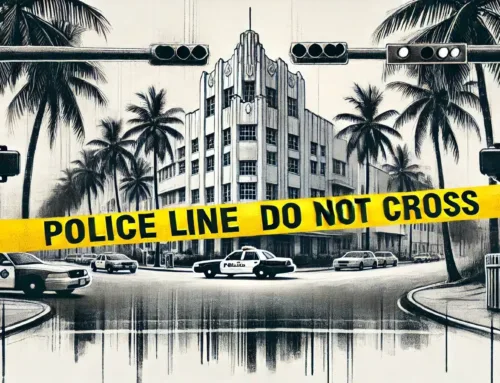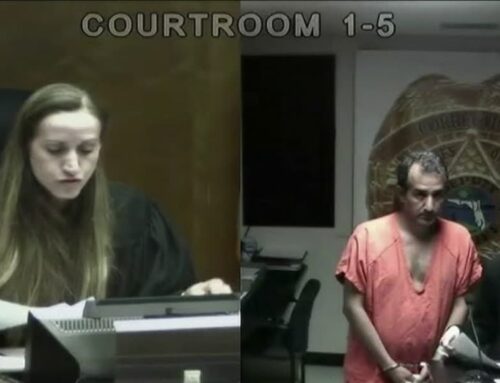The Alibi Defense in Florida
An alibi defense can be extremely useful for criminal defendants in Florida who are wrongly accused of crimes. Under Florida law, defendants have a constitutional right to present an alibi defense to juries. However, there are strict procedural requirements that must be followed to ensure a fair process. This article examines the key things a defendant needs to know in order to assert an alibi defense in a Florida criminal case effectively.
What is an Alibi Defense?
An alibi defense asserts that the defendant could not have committed the crime because he or she was somewhere else at the time. Florida courts have defined an alibi as “a defense that places the defendant at the relevant time of the crime in a different place than the scene involved, and so removed therefrom as to render it impossible for him to be the guilty party.”
In other words, the defendant claims: “I couldn’t have done it because I wasn’t there.”
A successful alibi defense can create reasonable doubt about the defendant’s guilt. Proving the defendant was elsewhere at the time of the crime can make it impossible for the prosecution to establish the defendant’s identity as the perpetrator.
Constitutional Right to Present an Alibi Defense
The U.S. Supreme Court has recognized that criminal defendants have a fundamental constitutional right to present an alibi defense under the Compulsory Process Clause of the Sixth Amendment and the Due Process Clause of the Fourteenth Amendment.
The right to present an alibi defense is an important part of ensuring the defendant’s right to a fair trial. As the Supreme Court stated in Taylor v. Illinois:
“The accused has the right to present witnesses and testimony in his defense. Its presentation is central to the defendant’s right to a fair trial. The right to compel a witness’ presence in the courtroom could not protect the integrity of the adversary process if it did not embrace the right to have the witness’ testimony heard by the trier of fact. The right to offer testimony is thus grounded in the Sixth Amendment.”
Procedural Requirements for Alibi Defenses
While defendants have a constitutional right to present an alibi defense, Florida law imposes strict procedural requirements. The main requirements are:
- Written Notice of Intent to Claim Alibi: The defendant must file and serve written notice of intent to claim an alibi defense upon the prosecuting attorney. This notice must specify where the defendant claims to have been and the names and addresses of alibi witnesses. The notice must be filed at least ten days before trial.
- Disclosure of Rebuttal Witnesses: Upon receiving the alibi notice, the prosecutor must disclose any witnesses who will testify in rebuttal to discredit the alibi. This disclosure must occur within 5 days after receiving the alibi notice.
- Updated Witness Lists: Both parties have a continuing duty to promptly update their witness lists if alibi or rebuttal witnesses are added or changed before trial.
- Exclusion of Evidence for Noncompliance: The court can exclude alibi or rebuttal witnesses for failure to comply with disclosure requirements. However, before excluding witnesses, the court must determine whether the noncompliance was willful and what impact it had on the other party.
Strong Corroboration Needed
An alibi defense is unlikely to succeed without strong corroboration. A defendant’s testimony alone is rarely enough to overcome the prosecution’s identification evidence. The best types of corroborating evidence are things like documentation showing the defendant was in jail or far away at the relevant time.
Precise timing is also crucial. Even strong alibi witnesses can be undermined if there is enough of a time gap that the defendant could have committed the crime before arriving at the alibi location. Thorough investigation and preparation are essential.
Proper Handling of Alibi Witness Lists
There are special requirements for alibi witness lists. If a witness’s address should not be disclosed for safety reasons, the defense attorney’s office can be listed instead. Minor errors like misspelling a name are not grounds for exclusion absent prejudice to the state.
However, the adverse inference jury instruction can apply if the defense raises an alibi but then fails to call supporting alibi witnesses at trial.
Limits on Prosecution Arguments
The prosecution cannot fabricate “straw man” alibis based on the defendant’s statements and then fault the defendant for not calling those nonexistent witnesses. However, if the defendant testifies about being with certain people at the time of the crime, the prosecution can comment on the failure to call those witnesses.
Contact an Experienced Criminal Defense Attorney
The alibi defense can be a powerful tool for defendants who are falsely accused of crimes in Florida. However, strict adherence to procedural requirements is essential. Thorough investigation and strong corroboration are also needed to overcome most juries’ skepticism of alibi defenses. Handled effectively, an alibi can instill reasonable doubt and win an acquittal.
If you or a loved one has been arrested or is being investigated for a state crime, CALL US NOW for a CONFIDENTIAL CONSULTATION at (305) 538-4545, or simply take a moment to fill out our confidential and secure intake form.* The additional details you provide will greatly assist us in responding to your inquiry.
ALWAYS INVESTIGATE A LAWYER’S QUALIFICATIONS AND EXPERIENCE BEFORE MAKING A DECISION ON HIRING A LAWYER







